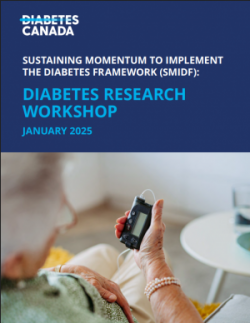New Grey Paper Calls for Stronger Links Between Research and Policy to Improve Diabetes Care

Posted date: September 16, 2025 |
Diabetes Action Canada is proud to have partnered with Diabetes Canada and the Canadian Institutes of Health Research Institute of Nutrition, Metabolism and Diabetes (CIHR INMD) in planning the 2025 Diabetes Research Workshop, which brought together leading researchers, policymakers, and patient partners from across the country. The findings are captured in a new report, Sustaining Momentum to Implement the Diabetes Framework: Diabetes Research Workshop. (Grey Paper 2025).
Turning Research into Action
The Grey Paper makes one point clear: world-class diabetes research must be mobilized into policy and practice if it is to improve health outcomes for the more than four million Canadians living with diabetes. Despite decades of discovery, major gaps remain in access, equity, and integration of proven approaches into health systems.
At the workshop, participants identified priority areas where knowledge mobilization and patient partnership are essential:
- Equity in care – Targeting interventions at the intersection of diabetes, social determinants, obesity, and cardiometabolic disease yields the highest return on investment.
- Surveillance and data – Canada needs better diabetes registries and integrated social data to guide policy decisions. Models such as CanScreen T1D, BETTER, CAPACITY, and Connect1d Canada already demonstrate how registries can improve care.
- Health services and policy research – Evaluating new care models in primary and community settings is critical to reaching structurally underserved populations.
- Knowledge mobilization tools – Researchers need support to communicate evidence effectively to policymakers. The Grey Paper highlights that CIHR INMD has adopted DAC’s KM consultation service and tools as a national model.
Why It Matters
The report underscores that without coordinated action, Canada risks worsening inequities and rising costs. For example:
- Diabetes costs the health system $18 billion annually.
- Only ~40% of underserved Ontarians receive retinopathy screening, despite it being a proven intervention to prevent blindness.
- Lower-limb amputations have risen in Ontario’s diabetes population over the past decade, even as stroke and heart attack rates have fallen.
- Out-of-pocket costs can reach $18,300 per year for type 1 diabetes, forcing many to skip or delay treatment.
Diabetes Action Canada’s Role
For Diabetes Action Canada, the Grey Paper is a strong validation of our mission: ensuring that diabetes research is not only excellent but also translated into policy and practice. Through our Knowledge Mobilization program, national registries and data initiatives, and patient-partnered research, we are building the bridge between discovery and real-world impact.
This report is both a roadmap and a call to action: to work together across sectors so that every person in Canada has access to prevention, treatment, and support that is timely, equitable, and evidence-based.






